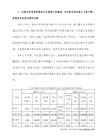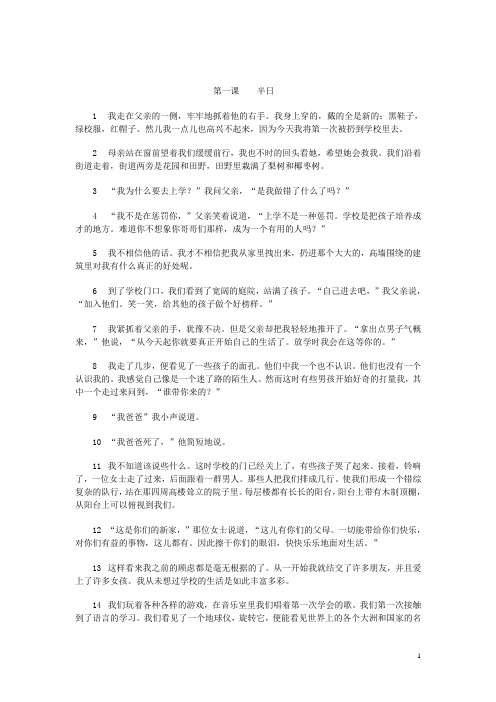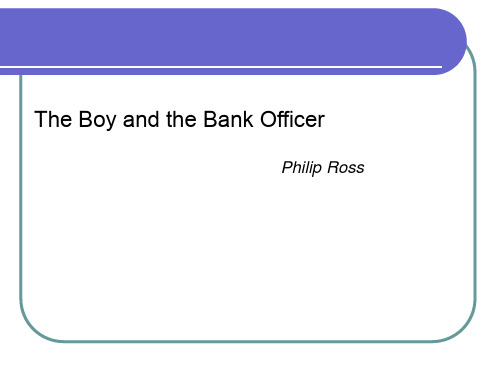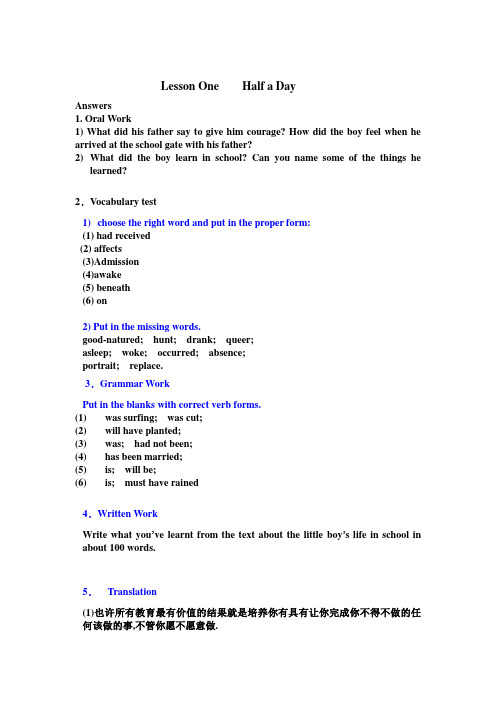Unit-2-现代大学英语精读第一册The-Boy-and-the-Bank-Officer答案
精读1》第二课theboyandthebankofficer

His Life
W T
B R
Background
A Culture Tip
The Beginning of Banking Banks first emerged in the Middle Ages when people grew tired of carrying around all their gold and began leaving their money with the goldsmith. Until the founding of the Bank of England in 1694, England's goldsmiths were its first bankers. They kept money and other valuables in safe custody for their customers. They also dealt in gold bullion and foreign exchange. They profited from acquiring and sorting coins of all kinds. To attract coins, the smiths were willing to pay interest.
W T B R
Warming up
Check-on Preview
• Fill each blank with one word from the list and find the corresponding explanation.
1. 2. 3. 4. 5. I have a friend who hates banks with a special ___ . …he replied in a voice rising slightly in ___ . You ought to get your parents here and ___ . You know, you really shouldn’t have ___ . I couldn’t believe what this ___ was saying.
现代大学英语精读第一册Unit02

They were going to Fort Lauderdale, Florida. There were six of them, three boys and three girls, and they got on the bus at 34th Street, carrying sandwiches and wine in paper bags. They were dreaming of golden beaches and sea tides as the grey, cold spring of New York vanished behind them. Vingo was on the bus from the beginning.
当公共汽车驶过新泽西,他们开始注意到一张从未动摇。他坐在前面的年轻人,满是灰尘的脸掩盖了他的真实年龄,穿着一身棕色西服,不适合他。他的手指被弄脏了他的香烟,咬他的下嘴唇内侧。他坐在一片寂静,似乎完全没有意识到他们的存在。
Deep into the night, the bus pulled into a Howard Johnson's restaurant and everybody got off the bus except Vingo. The young people began to wonder about him, trying to imagine his life: perhaps he was a sea captain; maybe he had run away from his wife; he could be an old soldier going home. When they went back to the bus, one of the girls became so curious that she decided to engage him in a conversation. She sat down beside him and introduced herself.深夜,公共汽车驶入一个霍华德·约翰逊连锁餐馆和大家除了温格在下车。这个年轻人开始怀疑,试图弄清他的生活:也许他是一名船长,他可能已经逃离他的妻子,他会成为一个家的老兵。当他们回到车上时,他们中的一个女孩变得如此奇怪,她决定让他在谈话。她坐在他的旁边,作了自我介绍。
现代大学英语课后答案(第一册)Lesson Four The Boy and the Bank Officer

Lesson Four The Boy and the Bank OfficerAnswers1. Oral work (answers omitted)2.Vocabulary test1)Choose the right word and put it in the proper form.(1) take (2) bring (3) possibly (4) probably(5) probably (6) each (7) every2) Put in the missing words.(1) relied (2) time (3) still (4) when(5) to (6) a (7) finally (8) started(9)As (10) trying (11) attention (12) tickets(13) then (14) back3.G rammar work.Put in a, an, the, or “/” in the blankets(1) a, /,/ (2) the (3) /,the (4) /,a(5) /, / (6) the, the (7) the, an4.Written workOne possible version:I was forced again by the bully to go to the bank for money. I handed over my own savings-account book to the bank officer, but unfortunately, he refused by saying that I was too young to withdraw money. I couldn’t believe it. When did this tiresome rule come out? A warn-hearted man argued with him that this so-called policy was ridiculous. But the officer insisted his opinion, I became hopeless. Suddenly, the kind man said to the officer that why you let the boy withdraw money before but not now. The officer annoyed, and still persisted in his refusal. This moment, I was totally upset and walked out of the bank. “What should I do? How can I deal with the wicked guy?”5.Translation.1)我们应该为保持一个安全的环境作出自己的贡献。
现代大学英语精读 第一册 课文翻译 杨立民

第一课半日1我走在父亲的一侧,牢牢地抓着他的右手。
我身上穿的,戴的全是新的:黑鞋子,绿校服,红帽子。
然儿我一点儿也高兴不起来,因为今天我将第一次被扔到学校里去。
2母亲站在窗前望着我们缓缓前行,我也不时的回头看她,希望她会救我。
我们沿着街道走着,街道两旁是花园和田野,田野里栽满了梨树和椰枣树。
3“我为什么要去上学?”我问父亲,“是我做错了什么了吗?”4“我不是在惩罚你,”父亲笑着说道,“上学不是一种惩罚。
学校是把孩子培养成才的地方。
难道你不想象你哥哥们那样,成为一个有用的人吗?”5我不相信他的话。
我才不相信把我从家里拽出来,扔进那个大大的,高墙围绕的建筑里对我有什么真正的好处呢。
6到了学校门口,我们看到了宽阔的庭院,站满了孩子。
“自己进去吧,”我父亲说,“加入他们。
笑一笑,给其他的孩子做个好榜样。
”7我紧抓着父亲的手,犹豫不决。
但是父亲却把我轻轻地推开了。
“拿出点男子气概来,”他说,“从今天起你就要真正开始自己的生活了。
放学时我会在这等你的。
”8我走了几步,便看见了一些孩子的面孔。
他们中我一个也不认识。
他们也没有一个认识我的。
我感觉自己像是一个迷了路的陌生人。
然而这时有些男孩开始好奇的打量我,其中一个走过来问到,“谁带你来的?”9“我爸爸”我小声说道。
10“我爸爸死了,”他简短地说。
11我不知道该说些什么。
这时学校的门已经关上了,有些孩子哭了起来。
接着,铃响了,一位女士走了过来,后面跟着一群男人。
那些人把我们排成几行。
使我们形成一个错综复杂的队行,站在那四周高楼耸立的院子里。
每层楼都有长长的阳台,阳台上带有木制顶棚,从阳台上可以俯视到我们。
12“这是你们的新家,”那位女士说道,“这儿有你们的父母。
一切能带给你们快乐,对你们有益的事物,这儿都有。
因此擦干你们的眼泪,快快乐乐地面对生活。
”13这样看来我之前的顾虑都是毫无根据的了。
从一开始我就结交了许多朋友,并且爱上了许多女孩。
我从未想过学校的生活是如此丰富多彩。
现代大学英语精读_the_boy_and_bank_officer

overuse
使用过度
overdrink
饮酒过甚
overeat
吃得过多
overharge
索价太高
over- (2): above; across;
beyond
overbridge 跨线桥;天桥
overcoat
外套;外衣
overshoe
套鞋
1.开户头 2. 结清账户
3.存款
4. 提款
5.透支 6. 节余
7.信用卡 8. 存折
9.银行卡 10. 存折
11.定期存款 12.活期存款
13.银行职员 14.银行出纳
15.自动提款机
12. a checking/current account 14. bank teller
15. A.T.M. (automatic teller machine)
Clerk: Please sign your name on the back of the check. All right. Here’s your passbook and your pass card. This passbook is for your own record. Bring the pass card with you every time you come to deposit or withdraw money. It also allows you to bank by computer during non-banking hours.
Philip Ross (1939— ) is an American writer based in New York. After working as a newspaper reporter for four years, he turned to freelance (自由职业作家) writing. Many of his articles have appeared in the New Yorker (《纽约人》), Reader’s Digest (《读者文摘》) and New York Times (《纽约时 报》). This text is taken from Strategies for Successful Writing: A Rhetoric and Reader, 3rd edition published by Prentice Hall, Inc. in 1993 in Englewood Cliffs, New Jersey.
现代大学英语精读_1lesson 2

The Boy
and
the Bank Officer
Philip Ross
Warm-up: Bank Vocabulary (1/2)
How many of the following bank-related words do you recognize?
A.T.M .(automatic teller machine amount in figures amount in words annual interest rate apply for/grant a loan Bank/pass/account book bill blank check/cheque by installment cash change check/cheque account chquebook/checkbook clerk coin collateral commercial/merchant bank 自动取款机 counter credit card 小写金额 current account 大写金额 daily interest account 年利率 debt 申请/批准贷款 denomination/face value 存折 deposit account 钞票 dime 空白支票 draw/withdraw 分期付款 earn interest 现金 exchange rate 找零 expense account 支票帐户 extension 支票簿 fill out/in a form 柜台职员 full refund 硬币 money in fives/tens 担保物 joint account 商业银行 柜台 信用卡 活期存款帐户 按天计息帐户 债务 面额 定期存款帐户 (美加)十分硬币 提款 赚取利息 汇率 公款支付帐户 延期 填写 全额偿还 五元/十元面额 联名帐户
现代大学英语精读第一册课后答案

Lesson One Half a DayAnswers1. Oral Work1) What did his father say to give him courage? How did the boy feel when he arrived at the school gate with his father?2)What did the boy learn in school? Can you name some of the things helearned?2.Vocabulary test1)choose the right word and put in the proper form:(1) had received(2) affects(3)Admission(4)awake(5) beneath(6) on2) Put in the missing words.good-natured; hunt; drank; queer;asleep; woke; occurred; absence;portrait; replace.3.Grammar WorkPut in the blanks with correct verb forms.(1)was surfing; was cut;(2)will have planted;(3)was; had not been;(4)has been married;(5)is; will be;(6)is; must have rained4.Written WorkWrite what you’ve learnt from the text about the little boy’s life in school in about 100 words.5.Translation(1)也许所有教育最有价值的结果就是培养你有具有让你完成你不得不做的任何该做的事,不管你愿不愿意做.(2)教育就是能让我们不断地发现我们的无知.Lesson Two Going HomeAnswers2.Oral work(1)What do you know about these young people?(2)How did the young people feel when they heard the story ?3.Vocabulary test2)choose the right word and put in the proper form:a)acrossb)risec)attend/ take part ind)reache)sincef)above/ below2) Put in the missing words.screaming; clenched; triumph; exaltation; except; stunned; misty; covered; ribbons; banner3.Grammar workTranslation.(1)Nobody could tell where the treasure was hidden.(2)The traffic will be very heavy on the road during the rush hour everyday.(3)He may have given her advice, but I doubt if it does her any good.(4)What she learned at university proved useful in her research .(5)If he had waited for the traffic lights to change, he would not have beenkilled.(6)If not I had seen him at the party yesterday evening !4. Written Work略.5. Translation(1)多给人原谅比多去谴责(2)如果我们想要去爱,我们必须学会如何去原谅.Lesson Three Massage of the LandAnswers1.Oral work (answers omitted)2. Vocabulary test1)(1) unfaithful (2) take out(3) talk over (4) send for(5) sent away (6) send up2) Put the missing words(1) sick / ill (2) alone (3) out (4) phone (5) on(6) until (7) church (8) only (9) answered (10) needed(11) clever (12) save (13) bit (14) now3) Write the numbers in words.(1) Two hundred and eight(2) One thousand five hundred / fifteen hundred(3) Seven thousand, one hundred and twenty-eight.(4) two dollars six-five / two dollars and sixty-five cents.(5) fourth(6) twenty-first(7) thirtieth(8) one half, three quarters, four fifths3.Grammar work (answers omitted)4. Written WorkOne possible version:My parents were born, brought up and married on this land. They have been living there through their life. They got up at sunrise and retired with their chickens. They planted and reaped rice and raised a few goats, cows and chickens which could provide what they needed in their daily life.. However, the piece of lands was no longer fertile, bleeding year after year, like them, getting old and exhausted. The soil was not difficult to till when there was a lot of rain, but in a bad year, it was not only the ploughs that broke but their hearts, too. The farmer life is hard but my parents are enjoying it. They cherish their land and never want to leave it.5. Translation.1) 家再贫寒,也没有任何地方能和它比。
《现代大学英语精读》第一册课后答案

《现代大学英语精读》第一册课后答案Lesson One Half a DayVocabulary1.1)Noun suffixes: -tion, -ment, -ing, -ness, -or/erAdjective suffixes: -ful, -less, -edAdverb suffixes: -ly2)1 adverbs: simply, hurriedly, terribly, possibly, miserably, politely, fortunately, practically, favorably, roughly, seriously2 adjectives: complete, accurate, particular, total, absolute, easy, angry, miserable, exact, final3 nouns: power/powerfulness, success/successfulness, care/carefulness, tear/tearfulness, meaning/mingfulness, home/homelessness, price/pricelessness4 verbs: express, impress, attend, celebrate, attract, spell, produce, pollute, prevent, oppose, organize, inform, appoint, require, judge 4)1 differ2 differently, different3 difference4 serious, serious, seriously5 seriousness, seriously polluted6 Fortunately/ Luckily, pollution, seriouly pollute7 attention8 attentively, attentive21 take2 lose/find3 dry4 play5 take/have6 tell/read/write7 change/speak/read/cross8 life/facts/reality/difficulties9 an event/ a plan/ the news/ the death/ the marriage10 a country/a place/ privacy11 a river/ a street/ a bridge/ a desert/ the sea12 an end/ a decision/ a place13 workers/ waiters/ servants/ people31 on their own2 show off3 burst into4 given rise to5 brought about6 to resort to7 clinging to8 gave rise to9 took advantage of10 in vain, make, out of4 Translation1 They took advantage of our helpless situation and took over our company2 Although there are still difficulties ahead of us, I am sure that we Chinese people will have the wisdom to bring about the peaceful unification of your country on our own3 It’s wrong to put emphasis on noting but GDP. It will give rise to many serious problems.4 He loves to show off his wealth, but that is all in vain. People still avoid him as though he were poison.5 He soon fell in love with the village and was determined to make it a beautiful garden together with other villagers.6 We must spend more money fighting against global warming. In addtion, we must resort to tough laws. It is not just a matter of money.7 When the police arrived at the school, the students and teachers were still in a daze.8 This corrupt official was still clinging to his power. He refused to step aside.9 When the man finally came into view, I found it was my father. I didn’t know how he managed to find this place in the blinding snow. At that moment, I burst into tears.10 She glanced at him from time to time. It was the first time in her life that she had found herself looking at a young man like that.5 fill in the blanks with the correct prep. or ad.1 of2 from3 for4 out5 up6 up7 up for8 out 9 with 10 of 11 of 12 of 13 up61 the door lock, very angry2 the city gate wide open, playing the guqin, very strange3 quite obvious/clear, his successor4 worried/anxious, talking to yourself5 so heavily polluted, pay the price6 the ground shaking/trembling/quaking, rolling down7 laugh, laugh himself8 put these things in order, do it9 lying in the grass, covered with blood10 interested in gardening or painting, keep him busy11 hear her say, put off/postponed。
- 1、下载文档前请自行甄别文档内容的完整性,平台不提供额外的编辑、内容补充、找答案等附加服务。
- 2、"仅部分预览"的文档,不可在线预览部分如存在完整性等问题,可反馈申请退款(可完整预览的文档不适用该条件!)。
- 3、如文档侵犯您的权益,请联系客服反馈,我们会尽快为您处理(人工客服工作时间:9:00-18:30)。
Unit Two The Boy and Bank OfficerVocabularyI.1.1. n11. n2. n12. n3. v past participle 13. adv4. v past participle 14. adv5. v past participle 15. adj6. n16.adj7. n 17. n8. n18. n9. adj 19. n10. adj 20. n2.1. 头痛8. 雪靴2. 钞票9. 手册3. 祖国10. 店员4. 伤心11. 夜总会5. 握手12. 交叉火力6. 山体滑坡13. 月光3.1. 繁星密布的填空10. 有钱人2. 狂风暴雨肆虐的大海11. 雨季3. 棉花般的雪12. 银发4. 多山地区13. 红润的面颊5. 落基山脉14. 多刺的鱼6. 肉嘟嘟的鼻子15. 瘦骨嶙峋的女孩儿7. 多毛的胸部16.气味难闻的奶酪8. 浓密的眉毛17.咸味食品9. 卷曲的毛发18. 华而不实的语言4.1. 一个男子突然站了起来,用他的鞋子朝他扔过去。
幸亏他及时低头躲了过去。
2. 我们再他回家前把房间通通风吧。
3. 她虽然八十大好几了,但还能穿针引线。
4. 我们必须勇敢面对这个危险。
总有人要在我们这里浑水摸鱼。
5. 她清楚地知道,如果她把那钱放进口袋,她就会倒大霉。
6. 会议是由一个刚刚平步青云,掌握大权的妇女主持的。
7. 正如老话所说,剥猫皮可以有很多办法。
(不必墨守成规)8. 一对年轻的恋人坠入爱河,仅因为此,他们被人们用石头活活砸死。
9. 我希望贫富差距能够缩小。
前两天我见到一个饿急了的年轻人在一家饭店里狼吞虎咽地吃残羹剩饭。
10.桌子上的食品看起来是如此的诱人,我都流口水了。
2 Complete the following verb+ noun collocation or expressions.1. have/keep/open/close2. have/keep/ show/ lose3. attend/hold/chair/have/open/close4. change/read/speak5. give/hold6. make/send/save/pay/earn/deposit/withdraw/change/borrow/lend7. wear/show/give/use8. obey/follow/make/change/break9. have/spend/keep/waste/kill/save/count/lose10. protect/represent/consider3. Complete the sentences by translating the Chinese in the brackets according to the sentence patterns in bold.1. is that we can’t find enough foreign markets2. is that without democracy there is no harmonious society3. is that we should give/allow students more freedom4. is not strong enough to be her husband5. reliable enough to be her husband6. is not big enough to hold so many people7. There doesn’t seem to be any different opinion8. Because at that time there seemed to be enough food for everybody9. Because there didn’t seem to be any good reason at that time.10. because he was being followed at that time11. my car is being repaired/fixed12. I hear it is being criticized by many people13. a good doctor, but he doesn’t know much about history14. an excellent English professor, but she doesn’t know much about history15. we may be poor, but we are no beggars16. I shouldn’t have told her in such a hurry.17. I shouldn’t have gone18. we should have listened to them.4. Fill in blanks with correct forms of the words and phrases listed below1.move in on, happened to 5. Because of, hand over2.aware of 6. the other day, on duty3.heard of 7. on the case, as to4.think twice 8. in the first place5. Fill in the blanks with the correct prepositions or adverbs.1. on 5. down upon2. into 6. up3. up 7. up to4. forward to6. Translate the following sentences into English1.It seemed impossible to me, but all the others looked very confident2.We looked around. There wasn’t building standing in sight. The earthquakeseemed to have destroyed everything.3.–He seemed to be in low spirits these days. I wonder why.--I think it’s because he doesn’t seem to be making much progress in his studies.He is afraid of being looked down upon by his classmates.4.– What are you looking for, Dick?--I seem to have lost my key. How annoying!5. If you find a word that does not seem to make any sense in the sentence, youshould look it up in the dictionary. That’s the only way to learn to use a word.6. They went on arguing for hours. Neither was willing to listen to the other. Isuddenly remembered someone saying “Discussion is an exchange of knowledge while argument is an exchange of ignorance”7. The situation there seems to be very complicated. The government has promised tolook into it.8. My grandpa seems to be getting better and better, but he still needs somebody tolook after him.9. Economists have already come to the conclusion that the crisis seems to be comingto an end. World economy is looking up.10. When I got well I looked at my bank account. To my sadness, I found my balancewas almost zero. All my savings in the past three years were gone.7. Fill in each blank with correct form of the appropriate word in the brackets.Note that more than one word may be appropriate1. say, ago2. before, remember/recall3. spoke, say4. speak/tell, after, speak5. After, since6. bring/take, since/because (Use “bring” if she was coming to you, and “take” if shewas leaving you)7. question, since/when8. Remember, bring9. matter, problemGrammar1.Study the given patterns and rewrite the following sentences after theexample.1.You ought to invite him to sing at the New Year Party2.You ought to do something a bit more challenging3.We ought to start preparing for celebration4.You ought to relax and stop worrying about him.5.If I knew their phone number, I would surely call them.6.If I was in charge here, I would help you.7.If I was offered the job, I would take it for sure.8.If I had a warm coast with me, I wouldn’t feel so cold.9.If his parents could afford it, they would support him at college.10.Ted might be able to solve these problems if he were here with us.2.Rewrite the following sentences by using subjunctive mood after the example.1.Jack shouldn’t have done that /thrown the exam paper to the floor.2.People shouldn’t have wasted waster like that.3.Joe shouldn’t have lied to his parents. / He shouldn’t have spent his parents’hard-earned money like that.4.I should not have given up so easily.5.I should not have jumped the queue. / He shouldn’t have behaved like that.6.Li Tong’s parents shouldn’t have read her private letter without her permission.7.I don’t think the students should have overacted. (They should have called thesecurity on campus)3.Fill in each blank of the passage with ONE suitable word.(1) types/kinds (2) lending (3) for (4) is(5) pay (6) opening (7) balance (8) store/keep/save/put4.Translate the following sentences using one of the patterns listed in Grammarexercises 1-2.1.You ought to try a different method.2.I think you ought to talk with our writing teacher about it.3.we ought to report the theft to the police immediately4.You ought to go and see your parents more often now that they are not in goodhealth.5.You shouldn’t have shouted at the elders like that6.You shouldn’t have been late for such an important meeting7.Isn’t Jim your friend? You shouldn’t have turned down/rejected his offer of help.8.As a college students, you shouldn’t have spent all your free time playingcomputer games.9.If I failed this time, I would try for the second time.10.If global warming continued, these islands would disappear.11.If I had a million yuan, I would buy my parents an apartment12.If I were elected president of the students’union, I might organize a pianocompetition.5.Identify and correct the mistake (s) in each of the sentences.1.No one knew what had happened/ was happening there. No one knows what ishappening/has happened there.2.My parents had a good reason to be angry with me. I shouldn’t have lied to themin the first place.3.The new Prime Minister is well aware that his government is faced with a lot ofproblems./ The new Prime Minister is well aware of the problems his government is faced with.4.If you won the prize, what would you do with the money.5.The guest was greeted with a bunch of flowers at the airport.6.The teller was arguing with a young customer about something when the narratorentered the bank.7.The narrator thought the bank’s policy was ridiculous。
